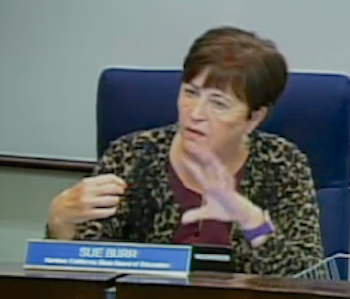State board no longer willing to let Washington drive accountability
Meeting for the first time since President Obama signed the Every Student Succeeds Act, members of the State Board of Education expressed optimism Wednesday that they can create a single system that meshes federal, state and local approaches to school improvement.
But, in identifying areas of uncertainty and some potential conflicts between the federal demands and the state’s vision, several board members made clear that the state should be driving the design of the system – not Washington. Under the No Child Left Behind Act, the federal law’s predecessor, Congress made the state’s acceptance of $1.5 billion in federal Title I funding for low-income children contingent on adhering to federal rules defining failing schools and dictating how to fix them.
Now the state has become the primary funder of money for low-income children and English learners through the Local Control Funding Formula, with $71 billion in proposed funding next year, said board member Sue Burr, likening Title I dollars to “budget dust” in comparison.

SOURCE: CALIFORNIA DEPARTMENT OF EDUCATION WEBCAST.
State Board member Sue Burr said that requirements of the Local Control Funding Formula should drive the state’s plan for school accountability, not the federal Every Student Succeeds Act.
The new federal law “gives us a wonderful opportunity” to align the federal and state school accountability systems, Burr said, “but we have flipped the way we fund the system for vulnerable children. I want to flip the equation: How can we make sure the federal government conforms to what we want to do as well?”
The Every Student Succeeds Act does significantly curb the power that former U.S. Secretary of Education Arne Duncan assumed under No Child Left Behind, creating conflicts with California. Instead, the new law adopts California’s approach to determine which low-performing schools need intervention through the use of several measurements, of which standardized test scores will be only one. Others will be high school graduation rates, growth on test scores, how soon English learners become proficient in English and a state’s choice of at least one non-academic indicator. It could be a measurement of college and career readiness, or, if student and civil rights advocates can persuade the state board, measurements of school climate and student engagement, such as chronic absenteeism. (See explanation of new law prepared by attorney Julia Martin, a consultant for the California Department of Education.)
The new law does offer states flexibility, and next week, in a U.S. Department of Education hearing in Los Angeles, state officials will ask federal officials to respect that commitment in forthcoming regulations. They will deliver the message contained in a two-page letter to the department that state board President Michael Kirst and state Superintendent of Public Instruction Tom Torlakson issued on Wednesday, in which they urge federal officials “to grant State board no longer willing to let Washington drive accountability | EdSource:

